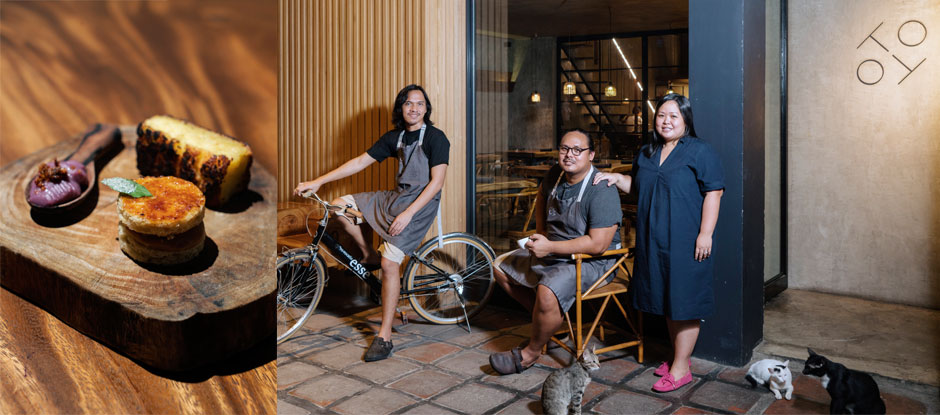Header: Ube with pastillas, banana inipit with burnt custard, grilled cassava cake and Toyo's staff
As Toyo Eatery in Manila becomes the latest winner of the Miele One To Watch Award for Asia, we talk to chef-owner Jordy Navarra about translating every day foods into fine dining experiences.
When Jordy Navarra turned the popular Tagalog children’s folk song, “Bahay Kubo," into a dish – putting together all 18 vegetables mentioned in its lyrics in an atypical salad (there are no lettuce leaves here) – it was regarded by many as one of the most inventive Filipino dishes to date. Apart from palatably translating the tale of a small nipa hut surrounded by a garden full of vegetables, the chef championed the use of Filipino ingredients – a movement that took its time to come to fruition.
In many ways, this also reflected a coming of age for Navarra, who had previously trained at The Fat Duck in the UK and Bo Innovation in Hong Kong. The dish clearly defined his culinary philosophy in line with his staunch patriotism. “It was something every Filipino knew or understood,” he says. “It was cultural, yet with local, everyday vegetables, therefore it tasted Filipino if you were thinking of the concept of terroir.”
Toyo Eatery, which opened in March 2016, serves heightened Filipino dishes using local ingredients and is a reflection of Navarra’s heritage, memories, training and experience. Its name is Tagalog for soy sauce, a Filipino condiment that may be an everyday household ingredient but which is also complex and takes time and dexterity to create, much like the dishes served at Toyo.
One of Navarra’s signature dishes is pork barbecue, a popular local street food that almost every Filipino has had growing up. The chef elevates the dish by using three cuts of pork (shoulder, belly and butt), layered together to play on flavours and textures before skewering and cooking it over charcoal and wood, and finishing it in pork bone broth in a process that takes about 12 hours. 
Three-cut pork barbecue
This cultural journey is also translated in Toyo’s cocktails, where local, lesser-known spirits are given the spotlight. Tapuey is a rice wine made from glutinous rice cooked, fermented and stored in earthen jars for months, originally created by the tribes from northern Luzon’s mountain provinces served during celebrations. At Toyo, it is turned into a Tapuey Sour – similar to a whisky sour, but with more depth.
It’s not surprising to note that one of the restaurant’s goals is “to make what we do at Toyo relatable to other Filipinos who come to eat as well as to everyone on our team who makes it”.
There is something for everyone: a full six-course tasting menu; a short three-course menu, and à la carte options. The restaurant is run by a young team led by Navarra and his wife May, who oversees the front of house, in a space that is also completely Filipino, where slabs of acacia were turned into tabletops and capiz lamps hang on walls framing their beautiful open kitchen.
Navarra and team have also recently opened their own take on a Filipino bakery. Panaderya Toyo, located two doors down from the restaurant, serves bread using only natural and organic ingredient. It follows the tradition of bread making in Spain, a country which has featured prominently in Philippine history; here, it’s barra instead of baguette.
“The dream has always been to make food that represents who we are and where we’re from,” says Navarra. “We wanted to make food and an experience we could be proud of and to be the best we could be at representing who we are. There’s still so much to learn and to do and we are happy just trying to get a bit better at it every day.”
Toyo Eatery
2316 Chino Roces Ave.
Makati
1231 Metro Manila
+63 917 720 8630
See inside Toyo with Chef Navarra:
Toyo Eatery will receive the Miele One To Watch Award on March 27th in Macao. Watch the countdown via livestream on Facebook and follow The World's 50 Best Restaurants on Twitter, Instagram and YouTube for more.

